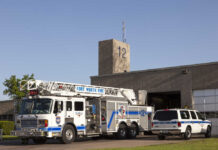A U.S. District Judge, Karen Marston, recently overruled a ban in place by a Pennsylvania township on the public display of the revised American Flag, often referred to as the “thin blue line.” This decree was issued amidst a heated debate in Springfield Township, located approximately 15 miles from Philadelphia, according to a report by the Independent on Tuesday.
The conflict arose when the Township incorporated the thin blue-line Flag into public areas, including the Township’s police union emblem. Judge Marston, in her court ruling, noted the Township’s frequent suggestion that the Thin Blue Line American Flag holds minimal public value and is considered ‘offensive’ and ‘racist.’ However, she reminded the Township that even speech that may be deemed ‘offensive’ is protected under the First Amendment.
The court’s decision was seen as a validation of his client’s assertions, according to Wally Zimolong, the lawyer representing the police officers. He asserted, “This is a firm win for the First Amendment and freedom of speech, demonstrating once again that the government discriminates when confronted with a message it disagrees with or finds offensive.”
The Township did not immediately provide a comment to the Independent.
The controversy in Springfield Township flared up in 2021 when the police union incorporated a flag, distinguished by a blue stripe, into its logo. This decision provoked a backlash from township commissioners due to the Flag’s connection to the Blue Lives Matter movement, seen as a counter-response to Black Lives Matter.
An attempt to quell the dispute involved the commissioners offering to finance a new logo design, supported by a $10,000 pledge from a private donor. However, the union rejected this proposition. Tensions heightened in Oct. 2022 when the Township issued a cease-and-desist letter to the union, accusing the Flag’s use of intensifying tensions between the police and the community. The letter demanded the removal of the Flag from the union logo or excluding Springfield Township’s name.
In defiance of these orders, the union held firm, resulting in a township policy that prohibited employees from displaying the Flag while on duty or township property. This action incited a lawsuit from police officers, who view the Flag as a symbol of support for law enforcement and its principles.
In her ruling, Judge Marston sided with the officers, remarking that the Township’s inability to demonstrate tangible harm from the Flag’s use bordered on unprofessional conduct and could have adversely affected police morale.
The judge, however, acknowledged that “the Flag undeniably carries racist connotations to certain community members. The individual Plaintiffs conceded that they have been informed the Flag carries racial triggers to some groups.”


















